[ad_1]
This is an updated version of a story first published on Oct. 8, 2023. The original video can be viewed here.
This week, the NBA Finals tip off, and perhaps no one will be watching more closely than Rich Paul, one of the premier agents in professional sports. He counts LeBron James as a close friend and client. The agency he founded – Klutch Sports Group – made deals worth almost $900 million this past summer for his NBA clients alone. As we first reported in October, Paul honed his dealmaking instincts as a kid, navigating what he called the hostile streets of his Cleveland neighborhood. Today, at 43, he’s rewriting the playbook for representing pro athletes. Rich Paul told us he was lucky, and when you hear his story, we think you’ll understand why.
Bill Whitaker: So did you used to come to games when you were younger?
Rich Paul: I went one time when I had to sit all the way up at the top, and you really couldn’t– couldn’t see the person.
Bill Whitaker: And now–
Rich Paul: Now it’s, now–
Bill Whitaker: –you’re sittin’ on the floor.
We joined Rich Paul courtside at a Cleveland Cavaliers game last season. He seemed to know everyone…
Rich Paul: What up dog? What’s good?
And it seemed everyone wanted to know him.
Fan: Thank you so much, I apprec-, hey, you’re my idol bro.
Rich Paul: Thank you brother. I appreciate it.
60 Minutes
In 2022, Paul got Cleveland star Darius Garland a $200 million deal, the richest in franchise history. Garland is one of more than 500 athletes on Paul’s roster.
Bill Whitaker: Who are some of the big names that we would all recognize?
Rich Paul: Which sport do you want? I mean we just had Jalen Hurts and– and– and DeVonta Smith play in the Super Bowl for the Philadelphia Eagles. And then you got the Anthony Davises and the Draymond Greens and obviously LeBron.
Bill Whitaker: Do- do you know the total value of the contracts you’ve negotiated?
Rich Paul: I would say it’s close to $3 billion, I think?
It’s more than $4 billion, but it’s hard to keep track when you’re always on the go.
Rich Paul: Showtime baby!
Before the NBA draft in New York City, we watched him work the phones…
Rich Paul: You know, it’s draft day, man. Anything can happen.
Work the room…
Rich Paul: Hey, Coach Self.
Bill Self: How’re you doin’, man?
Rich Paul: How’re you doin’, man? You all right—
Coach: Good seein’ you.
And work the angles to move clients like Duke center Dereck Lively II up the draft board.
Rich Paul: You ready?
Dereck Lively: Yes sir.
In college, Lively was known for his defense. But Paul had him work on his three point shot and, before the draft, invited teams to see. Lively shot up to the 12th pick, about 10 spots higher than first projected. It might not look like it, but Rich Paul is a towering figure in the NBA.
Rich Paul: I’ve always been the smallest guy in the room willing to take the biggest swing.
60 Minutes
Some of his biggest swings have been for his biggest client, LeBron James. Paul negotiated his jumps from Miami, to Cleveland, to L.A., deals that netted James $400 million and set him up to win two of his four championships. He told us he works to give players leverage.
Bill Whitaker: Some people say that you are destroying the player loyalty to the teams and the fans?
Rich Paul: Player loyalty to what? If I could be traded in the middle of the night to another team what I should be is educating myself to where if this is– isn’t goin’ the way I thought it was supposed to go, I can switch up, right? We’re not confined.
Bill Whitaker: Have options.
Rich Paul: I have op-. What’s the sense of havin’ money with no options?
That’s apparently how superstar Anthony Davis felt in 2018. The New Orleans center had a $127 million contract but was tired of losing. So he fired his agent and hired Rich Paul. Paul flouted NBA rules by publicly demanding a trade – earning the wrath of fans and a $50,000 fine for Davis. The drama landed Paul on the cover of “Sports Illustrated,” which called him the most “polarizing figure in the NBA.”
Rich Paul: When it was someone that didn’t look like me, it was genius, it was why you get a power agent but when it’s me, I’m destroying the league? I mean, those things are absurd.
He got Davis what he wanted – a championship ring and a deal now worth $270 million.
Rich Paul: There’s a saying that goes, “If you don’t got no haters, you ain’t poppin’.” (laughs)
Bill Whitaker: So you must be popping?
Rich Paul: I think I’m popping a little bit, you know?
He was popping a lot at his annual All-Star Game party, this one held in Salt Lake City.
Rich Paul: What’s up, dog?
We dropped in and saw giants of the court mingling with rappers, team owners and titans of industry over cocktails and canapes. Rich Paul had a full plate of business options, one from the president of Gatorade.
Mike Del Pozzo: I want to be your first call.
Rich Paul: Done
While we were chatting with him…
Rich Paul: Day Day!
Golden State Warrior Draymond Green cut in. The four-time NBA champion cycled through two other agents before signing up with Rich Paul, who landed him a $100 million contract over the summer.
Draymond Green: So then, you end up a young Black man who’s made more money than you can ever imagine, but you don’t know how to live with it, you don’t know what to do with it.
Bill Whitaker: And what does he do?
Draymond Green: Most agents treat athletes as if the athlete works for them. But there’s a multi-billion-dollar business going on around most athletes that they don’t understand. But they don’t have a Rich Paul to teach them. And that’s what’s special about him.
Paul’s improbable journey – the subject of his new memoir out last fall – started on the east side of Cleveland in the early 1980s, just as crack cocaine hit the streets. When he was about four, he learned his mother Minerva was hooked on crack. His father, “Big Rich,” recognized his son’s intelligence and kept him close, though they lived apart. He owned the neighborhood convenience store.
Bill Whitaker: So your dad’s store was just right in here?
Rich Paul: Yeah. And this was– this was my world.
This now empty corner was a hotbed of activity – legal and illegal.
Rich Paul: There was a shootout right here on this corner.
Big Rich taught his son to always think two steps ahead. He scraped together the money to send him to a Catholic high school away from the neighborhood. Still, there was no avoiding the streets.
Rich Paul: You don’t know what you’re in.
Bill Whitaker: That’s your– that’s your norm?
Rich Paul: That’s my norm. Sardines out the can that was today’s version of tuna tartare on the Waldorf rooftop, you know? (laughs) This was my education, though. This was my Harvard, my Michigan, was my Morehouse, and the same things I learned on this corner, I take it to the boardroom ’cause the one thing this teaches you that I don’t think you can learn from those institutions is people, characters. And on these streets, it’s no better way to learn character because they’re coming with everything.
60 Minutes
His dad taught him another skill – a way to make money if all else fails – with a pair of dice. Paul and his best friend Edward Givens were regulars at an open-air casino in the park.
Edward Givens: Fifty people crowded around this little area. And the energy was high. It was, it was an arena.
And Rich Paul was a natural.
Bill Whitaker: And how much would you earn?
Rich Paul: I mean, a slow day was $1,000.
Bill Whitaker: And a not-slow day?
Rich Paul: Ah- you know, $4 or 5.
Bill Whitaker: $4,000 or $5,000.
Rich Paul: Yeah.
Edward Givens: Easy.
Rich Paul: Easy.
Bill Whitaker: When you were 14, 15, 16?
Rich Paul: Oh, yeah.
Bill Whitaker: What did you learn from this experience?
Rich Paul: You gain a resilience here. We won majority of the time. But you also had to learn how to lose.
He suffered his biggest loss when he was 19. His father died from cancer, and Paul went all in on the streets, selling marijuana and crack cocaine.
Bill Whitaker: This is the very drug that your mother was hooked on.
Rich Paul: The absence of my dad allowed me to—to take that step, because I woulda never done that had he been around. I had too much respect for him. And it’s not somethin’ that I would sit here and– and glorify.
Bill Whitaker: It almost sounds like you were a full-time hustler.
Rich Paul: Oh yeah. But Jeff Bezos is a hustler. Think he’s not? Phil Knight was the ultimate hustler. The difference is they could go with their plan and their business idea and get someone to believe in them. It didn’t matter what idea I had. There’s no pathway to get there.
He found one through a stroke of luck. At the Akron-Canton Airport in 2001, Paul was wearing a throwback jersey – like this one – that caught the eye of another traveler: high school hoops sensation Lebron James.
Bill Whitaker: What did you see in him?
LeBron James: It began with him, you know, wearin’ the throwback jersey that I, you know, loved. But as we got to talkin’ about sports, we started evolvin’ and even talkin’ more and more just about life, and about our upbringing’, about our– our moms, and– and– and our communities, and stuff of that nature. And it just kinda struck. It just struck a chord.
When James entered the NBA, he hired Rich Paul as a right-hand man. Paul went on to work for LeBron’s agent and watched, listened and learned.
60 Minutes
Bill Whitaker: I understand that you would go into meetings with the likes of Warren Buffett?
Rich Paul: Being in those rooms, it’s much better to– to listen than to talk. If you listen, you might actually learn something. And you start to kinda, you know, work your way on your own.
After just four years, he struck out on his own and launched Klutch Sports Group in 2012. LeBron James went with him.
Bill Whitaker: When you first started this, you were underestimated?
Rich Paul: Not only was I underestimated, I was also not wanted. I didn’t look like the success in our industry, especially from a place of decision making. And I wanted to disrupt the industry. I wanted to be impactful, but I wanted to come from a place of purpose.
In 2013, with his first negotiation as agent – for Phoenix Suns guard Eric Eledsoe – he proved the naysayers wrong. He said the Suns had offered $28 million.
Rich Paul: And then $48 million.
Bill Whitaker: And you turned it down?
Rich Paul: Yeah.
Bill Whitaker: What was on the line?
Rich Paul: My career. Everyone was calling and saying, “He’s crazy. He doesn’t know what he’s doing. He’s inexperienced.”
Bill Whitaker: It sounds like you are really comfortable rolling the dice.
Rich Paul: I was born a dice roller. (laughs)
60 Minutes
His gamble paid off. After hanging tough for a year, Klutch got Bledsoe a $70 million deal, 42 million more than the Suns’ first offer.
Rich Paul: Great room–
Today, Klutch has more than 100 employees with offices in LA, New York, Atlanta, and Nashville.
Rich Paul: And they’re both in the same draft class–
Paul teamed up with powerhouse agency UTA to expand Klutch’s reach.
Rich Paul: I had to build– a multi $100 million company to get people to believe in me, and there’s still doubt.
Bill Whitaker: Critics say he’s only successful because of his relationship with you?
LeBron James: I mean it’s disappointing to hear that.
Bill Whitaker: But you gave him an opportunity.
LeBron James: Yeah. And I don’t give people opportunities much. And he took well way beyond– than what he even imagined.
Rich Paul now has a New Balance signature shoe, a first for an agent. His partner is more famous than he is. He’s been in a relationship with Adele for three years.
Dwayne Johnson: Adele
She gave him a shout out at the Grammys.
Adele: Oh God, Rich! He told- he said don’t cry! If you win anything tonight don’t cry! And here I am crying.
A couple of weeks later, at his All-Star Game party, Paul’s friends recognized his achievements…
LeBron James: This is from us. This is from us.
With a $140,000 watch.
Rich Paul: Wow. Wow. Wow.
Bill Whitaker: Do you have to pinch yourself sometimes?
Rich Paul: All the time. (laughs) I had it worse than a lot of people but I evolved, I matured, I transitioned.
Bill Whitaker: How does that feel?
Rich Paul: Feels great. It feels earned, you know? It wasn’t given, for sure, it was earned, which is good. I like that.
Produced by Marc Lieberman. Associate producer, Cassidy McDonald. Broadcast associate, Mariah B. Campbell. Edited by Richard Buddenhagen.
[ad_2]
Source

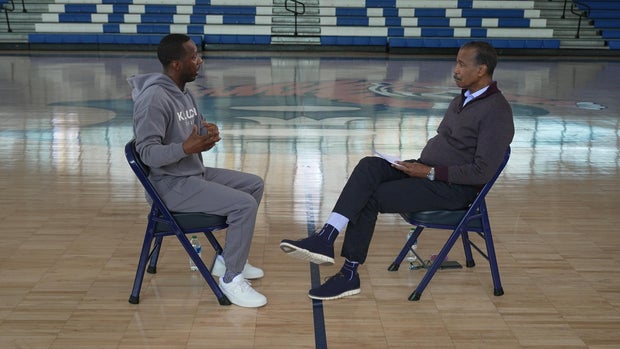
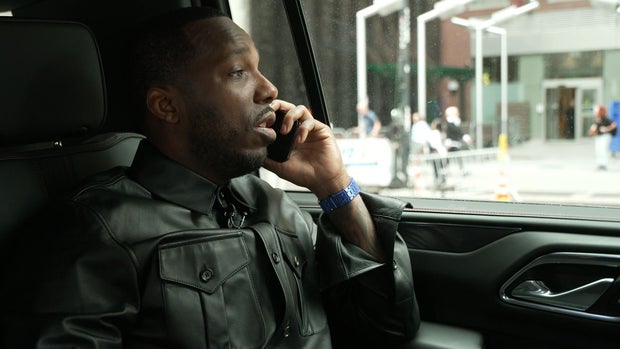
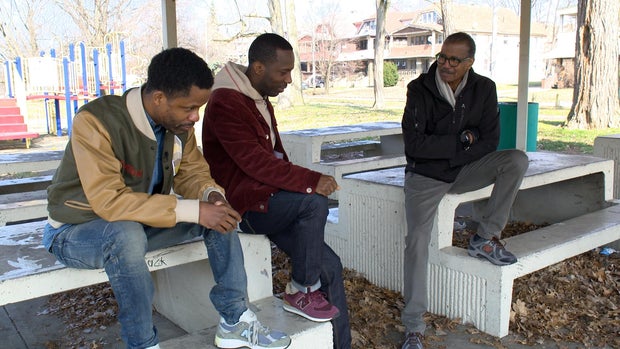
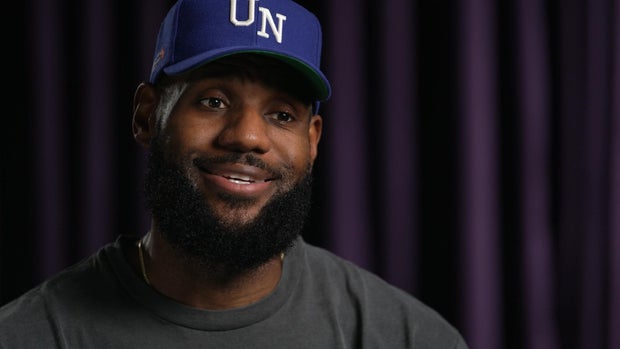
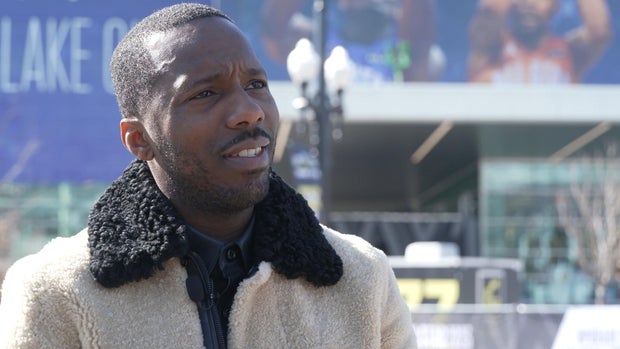

Leave a Reply